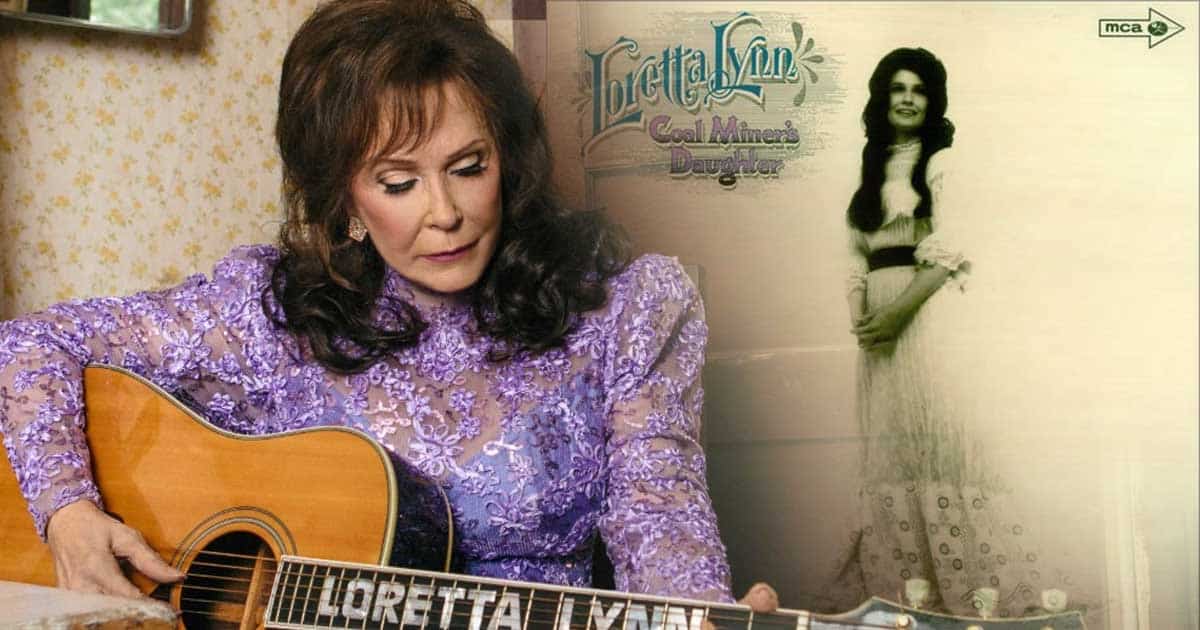
In the quiet hills of Butcher Hollow, Kentucky, a young girl once stood barefoot on a creaking porch, her voice rising above the cicadas and coal dust. That voice — untrained, unpolished, and utterly unforgettable — would one day echo through the grand halls of the Grand Ole Opry, the White House, and the hearts of millions. But before the rhinestones, before the gold records, Loretta Lynn was simply the daughter of a coal miner, a girl with more grit than the mountains that raised her.
Born April 14, 1932, into a world that didn’t appear on most maps, Loretta’s childhood was shaped by cold winters in a drafty log cabin, scarce meals, and a father who came home each day with coal embedded in the lines of his hands. “We were poor, but we didn’t know it,” she often said — though the truth was, she knew it well. Illness struck her young, with brutal, archaic treatments done without anesthesia. But even then, she endured, clinging to song as if it were a lifeline.
When she met Oliver “Doolittle” Lynn, she was barely a teenager. He was twenty-one, unpredictable, and — for better and worse — the man who would alter her life forever. Their marriage was a tempest of love and violence, faith and betrayal. Doolittle drank, disappeared, and strayed, but he also saw a spark in Loretta no one else had dared to name. He bought her a $17 guitar from a Sears catalog and told her to sing in every honky-tonk and radio station that would let her.
From that unlikely foundation came a career built on truth-telling. Loretta wrote songs like “Don’t Come Home A-Drinkin’ (With Lovin’ on Your Mind),” “Fist City,” and “The Pill” — plainspoken, defiant, and unafraid to scandalize the men who ran country radio. Women saw themselves in her lyrics, and men couldn’t ignore her power. She didn’t soften the edges; she sharpened them.
Yet fame never spared her from heartbreak. In 1984, she lost her son Jack in a tragic accident on the family ranch. His death left a silence in her life that no song could fill. Her voice, once a steel blade, carried a new tremble. “Grief doesn’t make you louder,” she seemed to say in every note after. “It makes you quieter.”
Loretta also carried a lifelong belief that the veil between the living and the dead was thin. She spoke of seeing Confederate soldiers in her Hurricane Mills home, of feeling premonitions before tragedy struck. And late in her life, in Johnny Cash’s Hendersonville cabin studio, she froze mid-song and whispered, “Johnny.” She claimed she saw him — a man in a gray suit, standing still in the doorway, watching. “He came to check on me,” she later told her daughter. To Loretta, it wasn’t frightening. It was a goodbye between two legends who understood each other’s burdens.
Even after strokes, a broken hip, and the slowing of age, Loretta wasn’t finished. She returned in 2021 with Still Woman Enough, an album produced by her daughter Patsy and Johnny’s son John Carter Cash, joined by Carrie Underwood, Reba McEntire, Tanya Tucker, and Margo Price. It wasn’t just an album — it was a passing of the torch, a reminder that steel in the soul doesn’t rust with time.
On October 4, 2022, Loretta Lynn passed away peacefully in her sleep at her beloved ranch, aged 90. Her death was quiet, but her life had been thunder. Tributes poured in — from artists she inspired, from fans who felt she’d lived their stories in song. The Grand Ole Opry mourned her like family. Reba recalled the day Loretta comforted her after a miscarriage. Carly Pearce called her “country music’s heart.”
And when her granddaughter Emmy Russell stood before thousands to sing “Coal Miner’s Daughter,” the crowd rose to their feet, not just in nostalgia, but in gratitude.
Loretta Lynn was more than a star. She was a survivor who turned hardship into melody, silence into defiance, and loss into a kind of beauty that could break you and heal you in the same breath. Long after the hollers have gone quiet, her voice will still rise — strong, clear, and woman enough.